On Thanksgiving Day were were excited about the purchase of 30 jembes (hoes with axe handles) and 8 machetes. That afternoon, word spread that there were tools for working in the small household shambas (farms) and the day was filled with planting! I text friends to tell them how the Village had become alive after the first rains. Everyone planted, young, old, girls and boys. The place was unmistakably more active. The tools were purchased with some money from friends at IHM, my old school in Kentucky. The activity turned to fear as word spread that some boys had walked to the sand dam, newly filled with water from the rains. They went swimming. Rumor had it that one boy got stuck in the silt and sand, another went in to save him and both were trapped. "Bring torches, ropes and come!" I grabbed my boots, flashlights and some sweatshirts, for I knew they would be cold when freed from the water. I raced with Zac, a Kenyan volunteer, to the large shamba to the water. We passed crying children and grandmothers who had obviously been told to return home. They were to count their children in the households. There was talk that two drowned but they weren't sure if that was all. George and Steve met us to say that two boys could not be saved and their bodies remained. They had been submerged for over an hour. The police had been called and it was now a recovery effort, and it may be started again at daylight. It was too dark to see the water, let along see deep below. Some waited at the dam, I headed to the children in the household clusters. I walked through the village and at each washing center, in the middle of the four-house clusters, children sat, quiet. "Did you hear Eddie? Our dear friends . . . " "Eddie, I am not feeling very much OK. " The kids were in disbelief and they were alone in their questioning and despair. It was Mutisia and Mutombuki (Muki) two boys from the 6th and 7th GRade. Both great boys, athletic, one a goalie for the football team. All of the Village's grandmothers went to console the two grieving grandmothers. One was Monica, nearly 100 years old, though no one knows for sure.
And here is where my discomfort begins. Stay with me as I journey into my own feelings of life and death.
I was unfamiliar with the African culture when it comes to grieving and death. It is a strong Kamba tradition at the Village in Kitui. After the news spread, I was amazed to see children who lived in one of the two houses of the boys, out finishing washing their school clothes for the next day! Even Wmbua, little brother to Muki, was outside - not understanding what was going on. There are no adults to explain, comfort, communicate. I walked round and round the Village - just asking - "Are you ok? After about ten in the evening I went back tot he Guesthouse, my house and met some of the other staff and volunteers. It was late. They were exhausted but they found it difficult to go home. They talked about the sad recovery - two thin, naked boys, covered in mud. I was uncomfortable, not wanting to know more or discuss it. They talked and I listened to Kenyans talking about their own childhood experiences of death and tragedies at young ages.
The next morning, I left the house determined to be the first adult the children would see at school. You need to understand that on a normal day, the children begin arriving around 6:45 carrying firewood for the day. There are usually no teachers until around 8:00, while students wait for a student leader with keys and begin to wash the rooms and prepare the school for the day. Today was no different. The students were quiet and reserved. At around 8:00 a student rang a bell and they began their own assembly, a time where they usually sing, raise the flag and say a prayer. A young girl handed me an English Bible and asked me to read for the school. We stood outside around the flag pole in classroom order, in lines with smallest in the front, older students in the back. I spoke to them as much as my language skills permitted, told them not to be afraid and about a world that was without end. I told them we prayed with the two boys and with their parents who had died. We said the Our Father and I read from the Psalms, "The Lord is my shepherd . . . " The teachers arrived but did not address the students at all. They did not enter the classrooms all day. They went to the staff room and began grading the student end of year exams. Mariah and I spent the day going back and forth between the 6th and 7th Grade classrooms, quietly being present and available. At around 10:00 a.m. Sr. Mary came from Karen (Nairobi) and went to each class, talking openly about their death, what the children remembered about them, where they sat. She did the normal things I would have done in a school of children who were afraid and did not know what was happening. I asked one of the teachers what I should do when the older boys were crying uncontrollably. "You must act as if they are not crying. If you console them, others will join and they will not stop." Some of these boys were at the water when the boys died. Some were feeling tremendous sadness and guilt. Cold, hard, what seemed like repression of emotions. They have done it probably since the death of their parents. As I was told, the Village brought these children from a painful life to a place of peace and joy and safety. These deaths have introduced pain, once again, into their lives.
As you move back through these entries, you may understand how I have come to be "ok" and at peace with the harshness of how these deaths were handled. I so wanted to save the children from the pain, from the truth that LIFE IS HARD. YOU WILL DIE. (More to come.)
skip to main |
skip to sidebar

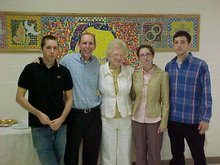

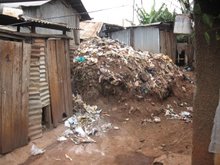
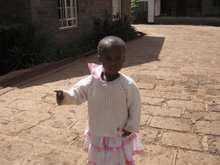

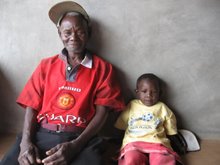
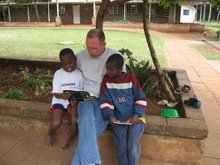
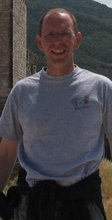

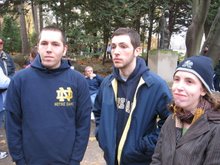
At ND Game
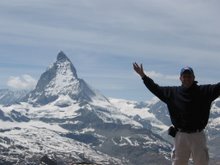
I am this grateful!
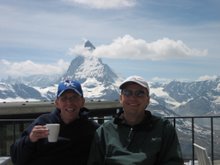
Ed and Chris
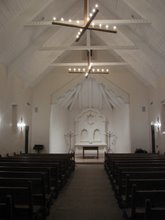
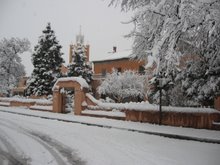
OLD TOWN
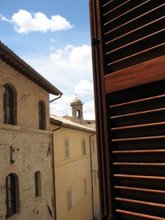
Assisi 2006
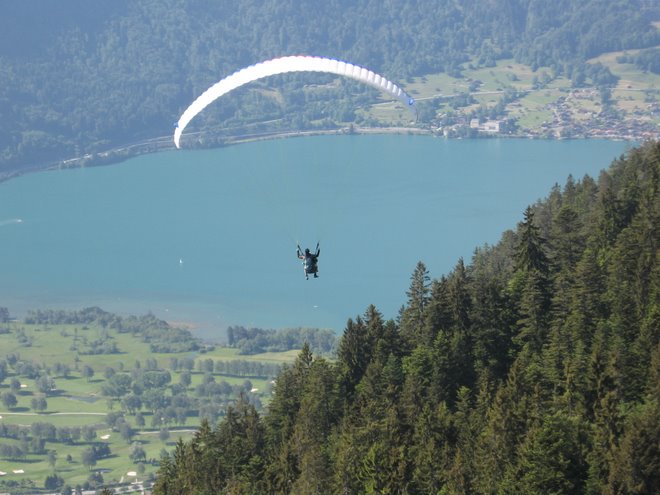
A Leap
The spiritual journey is one of continually falling on your face, getting up, brushing yourself off, looking sheepishly at God, and taking another step.
THE MASAI WOMEN EMPOWERMENT PROJECT
For more information on the Masai Project in Athi River, please visit the following site:
www.mwep.blogspot.com
To donate: please see below.
www.mwep.blogspot.com
To donate: please see below.

DONATE
WANT TO DONATE?
If you would like to donate to my journey and my projects in Kenya, checks may be sent to :
Immaculate Heart of Mary Parish
MISSION FUND
5876 Veterans Way
Burlington KY 41005
Make sure it is marked clearly for Ed Colina's Mission work.
If you would like to donate to my journey and my projects in Kenya, checks may be sent to :
Immaculate Heart of Mary Parish
MISSION FUND
5876 Veterans Way
Burlington KY 41005
Make sure it is marked clearly for Ed Colina's Mission work.
LOOK AT SOME PICS OF THE VILLAGE - Some other good VILLAGE BLOGS
UPDATE PICS ON FLICKR
ALSO - CHECK OUT MICHAEL'S AFRICAN BLOG
Jennifers Blog from Kenya - More Village Info
Both have info and pictures from the Nyumbani Village
ALSO - CHECK OUT MICHAEL'S AFRICAN BLOG
Jennifers Blog from Kenya - More Village Info
Both have info and pictures from the Nyumbani Village
CONTACTING E.M.C.
COOL SITE
The best way to contact me beginning in September is via email. I'll get it when I can. I am not sure how often I will be able to get into Nairobi from the Village - whether monthly or less frequently. ecolina@aol.com Pics should be posted here.
Donations can be made via the school. 859 689-4303 They will be forwarded to me by my daughter. It is all appreciated and will be well-used!
Packages to Kenya are discouraged because of the customs costs upon arrival. Snail mail can be sent to the address listed here and I'll get mail when in Nairobi. Email is probably best.
Beginning August 14th my U.S. cell phone is no longer in operation.
The best way to contact me beginning in September is via email. I'll get it when I can. I am not sure how often I will be able to get into Nairobi from the Village - whether monthly or less frequently. ecolina@aol.com Pics should be posted here.
Donations can be made via the school. 859 689-4303 They will be forwarded to me by my daughter. It is all appreciated and will be well-used!
Packages to Kenya are discouraged because of the customs costs upon arrival. Snail mail can be sent to the address listed here and I'll get mail when in Nairobi. Email is probably best.
Beginning August 14th my U.S. cell phone is no longer in operation.
Family Celebration

By Mahatma Gandhi
Recall the face of the poorest peson you have seen and ask yourself if the next step you take is going to be of any use to that person.
"Feed the Children" Video Clips
There are a couple of interesting Kibera Slums video clips from Feed the Children Organization. I have no association with the organization but was interested in the clips. CLIPS HERE


Some Background on Kibera Slum
The slum originated in 1920 as a Nubian soldiers' settlement. The British colonial government of the time allowed them to squat on a hillside outside Nairobi, primarily because the British felt the Nubian population could be trusted during the Kikuyu-dominated Mau Mau movement of the 1950s.
After Kenyan independence in 1963, however, various forms of housing were made illegal by the government, rendering Kibera unauthorised on the basis of land tenure. Essentially, since the early 1970s landlords have rented out their property to a significantly greater number of tenants than legality permits. Since the tenants, who are extremely poor, are unable to obtain or rent land that is "legal" according to the Kenyan government, the slum-dwellers find the rates offered to be comparatively affordable. The number of residents in Kibera has increased accordingly despite its unauthorised nature.
This process has been exacerbated because, over time, other tribes have moved into the area to rent land from the Nubian landlords. Since then, the Kikuyu have come to predominate the population and by 1974 had effectively gained control over administrative positions. This demographic change subsequently determined which of the dwellings, all of which are technically illegal, are demolished or permitted by the government. This occurs primarily through political patronage, as certain owners are protected by local government officers largely based on their Kikuyu ethnicity, and changes in administrative personnel may have drastic impacts on a landlord's security.
Kibera has residents coming from all the major ethnic backgrounds with some areas being specifically dominated by one tribe (eg. Kisumu Ndogo that is predominantly Luo). Many are coming from rural areas due to the problems of rural underdevelopment. This multi-ethnic nature coupled with the tribalism of Kenyan politics has led Kibera to be the site of small ethnic conflicts throughout its near 100 year history (most recently in 2002 in which many resident's homes were attacked by arson).
Kibera is located southwest of Nairobi city centre and is the same size as Manhattan's Central Park (approximately 2.5 square kilometres (600 acres)). Nairobi Dam is to the south. It is sited approximately 5 km south east of the city centre of Nairobi. It holds more than a quarter of Nairobi's population. The estimated population density is 300,000/km². There are a number of villages, including Kianda, Soweto, Gatwekera, Kisumu Ndogo, Lindi, Laini Saba, Siranga/Undugu, Makina and Mashimoni.
A railway line passes through Kibera, thus passengers heading for Kisumu can view the slum. Kibera has a railway station, but due to absence of effective commuter train system in Nairobi, most Kibera residents use buses and Matatus to reach city centre. However, riding the Matatus proves to be considerably dangerous, due to the occasional carjacking that goes on in Nairobi especially in the evenings and at the end of the month. Irresponsible driving in the area and poor traffic law enforcement also makes travel perilous.
Kibera is heavily polluted by soot, dust, and other wastes. Open sewage routes, in addition to the common use of Flying toilets, also contribute to contamination of the slum with human and animal faeces. The combination of poor nutrition and lack of sanitation accounts for many illnesses. Not only are death by disease and conflict common inside this slum, but it is estimated that 1/5 of the 2.2 million Kenyans living with HIV live in Kibera.
Winnie - 2 Years Old

NYUMBANI INFORMATION
Kibera Podcast - Mature Viewing

Radio Interview with Fr. D'Agostino
KIMANZI AND A GRANDFATHER

AIDS in Africa
Presently there are 40 million people infected with HIV/AIDS globally, with more being infected every day. HIV/AIDS is 100% lethal if left untreated. The UN estimates that 68 million people will die in sub-Saharan Africa because of AIDS in the next twenty years.
That is:1.7 times more than the 40 million deaths in World War II, the most destructive war in human history.
5 times more than the 13 million deaths in the previous two decades of the AIDS epidemic.
307 times more than the 221,000 deaths in the Asian tsunami disaster of 2004.
Other Statistics:In 1990 there were 7 million people infected with HIV/AIDS in sub-Saharan Africa.
In 2000 there were 25.3 million infected.96 percent of HIV infected persons live in developing nations where drug therapies are largely unaffordable.
Presently there are approximately 15 million children orphaned by AIDS in sub-Saharan Africa. That number is expected to grow to 40 million in the next two decades.
3 million people died of AIDS in 2000. 12.1 million children were orphaned.
Every 5 minutes 3 people die of HIV/AIDS. That is over 850 deaths every day or 315,000 a year. With each death, at least one more orphan is usually left.
Every minute 10 people are infected with HIV/AIDS, which equates to 600 new infections an hour, 15,000 a day.
Friends

EMC in ASSISI

Enquirer Article
I agreed to talk to the Enquirer in hopes that it might more widely advertise our search for a new principal. I appreciate the article but am embarrassed. Now it's official - I have to do something! Here it is.
Fun . . .
"Pulling out the chair beneath your mind And watching you fall upon God - There is nothing else for Hafiz to do that is any fun in this world!"-Shamsud-din Mohammed Hafiz Muslim Mystic (1320-89)
Ash Barker - Make Poverty Personal
"The idols of this age say you can buy meaning in life in a department store, while the real God weeps that creation has swallowed such delusions whole without chewing and longs for us to love our neighbour in need. The starving millions have no voice against the shrieks of temporal happiness those pursuing such items risk all for. Authentic loving of God and neighbour then is still the great need of the hour ."

Henri Nouwen
"People who pray stand receptive before the world. They no longer grab but caress, they no longer bite but kiss, they no longer examine but admire."
Merton Gets It Right
"My first human act is the recognition of how much I owe everybody else."
My 3 Loves

At ND Game
Zermatt Summer 2006

I am this grateful!
For Times Like These

Ed and Chris
New Year's Eve Prayer
God of the seasons, Lover of the ages, Master of every moment: You who are beyond time yet within all time. We return to you what you have given to us — the moments, the minutes, the hours, the days, the weeks, the months, and the year of 2006. Time has been gracious to us again, and we thank you for freely giving us these human bodies, these events, and these relationships. We have lived another year and we have died another year, and now you are granting us the beginnings of another.
We now hand over to you the blessed year, 2006, with all that it gave us and all that it took from us, knowing that both are necessary, just like our breath. We trust you in both the givings and the takings, the inhalings and the exhalings. May every breath of 2007 be a breath of the Holy Spirit, joyfully received and joyfully returned, beginning with this one right now.
Amen
God Alone-New Year's Eve

Merton Speaks
"MY LORD GOD, I have no idea where I am going. I do not see the road ahead of me. I cannot know for certain where it will end. Nor do I really know myself, and the fact that I think that I am following your will does not mean that I am actually doing so. But I believe that the desire to please you does in fact please you. And I hope I have that desire in all that I am doing. I hope that I will never do anything apart from that desire. And I know that if I do this you will lead me by the right road though I may know nothing about it. Therefore will I trust you always though I may seem to be lost and in the shadow of death. I will not fear, for you are ever with me, and you will never leave me to face my perils alone."
New Years - New Mexico

OLD TOWN
Perfect Joy

Assisi 2006
Blog Archive
- August (1)
- June (1)
- May (10)
- April (7)
- March (21)
- February (5)
- January (4)
- December (8)
- November (5)
- October (1)
- September (5)
- August (3)
- July (4)
- June (10)
- May (6)
- April (1)
- March (5)
- February (11)
- December (15)
- November (10)
- October (15)
- September (8)
- August (13)
- July (7)
- June (7)
- May (5)
- April (13)
- March (8)
- February (10)
- January (8)
Interlaken Summer 2006

A Leap